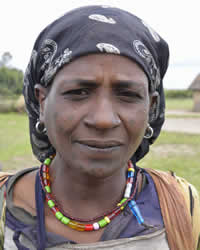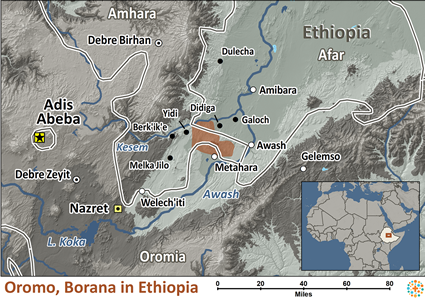The various Oromo people groups are the largest, most widely dispersed groups in Ethiopia. They also reside in Kenya, Somalia and Egypt. Composed of approximately a dozen tribal clusters, these peoples prefer just the term "Oromo" when speaking of themselves. Nearly all of these peoples speak mutually intelligible dialects of a language called "Oromo, Borana-Arsi-Guji". Although they retain similarities in their descent system, they differ considerably in religion, lifestyle and political organization. The Oromo have various clans, including the Kereyu. Most likely they were pushed westward from the Horn of Africa by the Somali during the tenth century. Together with the Amhara and the Tigrai, they dominated the government and military classes of the Ethiopian Empire. In the 1700s and 1800s, these peoples became a prominent force in Abyssinian (Ethiopian) politics. During the nineteenth century, they converted to Islam.
The Kereyu Oromo are herdsmen with a warrior tradition. They determine a man's status by the number of livestock he owns. Virility and male attributes are considered desirable, especially bravery and war skills. Although they honor fighting enemies from outside, they demand peace within their own community. Oromo boys may begin training at an early age to become warriors, but one basic value of the Oromo is tokuma, which is identification with the group. The religious, social, political and economic life of the Oromo revolves around this. Cooperation is central to this system, especially in work arrangements. The Kereyu Oromo live in rural areas where they make a living primarily from raising animals along with some farming. The typical dwelling is a tukal, or a circular hut made of acacia branches covered with grass mats. The cone-shaped roof has an opening that allows smoke to escape. Villages are made up of 10-80 families. Their staple diet includes durra (a cereal grain), maize, beans, rice, milk, meat, and wild fruits. Coffee and tea are both popular beverages. The Kereyu Oromo family is headed by an authoritarian father who has the right to expect total obedience. Men usually have only one wife, and children are considered a necessity. The more children and grandchildren a man has, the greater his prestige. Some Kereyu Oromo have moved to the towns, attracted by employment opportunities and modern schooling. Others have entered national security forces, the industrial labor force, or fields of trade, transportation, and education.
The majority of the Kereyu Oromo are Muslim; however, they still practice their traditional religion. These ethnic religionists worship a supreme being named Waqa. Wadaja feasts are organized on various occasions, and they sacrifice livestock in Waqa's honor. Today, these feasts reflect a Muslim influence. Many Kereyu Oromo believe that objects such as trees, springs, and rocks have spirits. They also believe that spirits called jinn may take possession of people. Adults fast during Ramadan (the Muslim holy month), but few celebrate other Muslim festivals.
Oromo villages usually have no electricity. Medical care is poor, and access to medicine is limited. Their water supply comes from rivers and springs. Today, there is a great need for Christian workers among the Oromo. Also, leadership training and discipleship of new believers is critical if growth is to continue and new churches are to be planted. There is potential for Oromo movements to Christ, but workers must go!
Pray for workers to go to each Oromo people, especially the Kereyu clan. Pray for Oromo disciples to make other disciples who will make even more disciples!Pray for spiritual hunger among the Kereyu Oromo people, especially their leaders. Pray for the Lord to show himself powerful and loving by providing abundance to the Kereyu Oromo people.
Scripture Prayers for the Oromo, Kereyu in Ethiopia.
| Profile Source: Joshua Project |

























